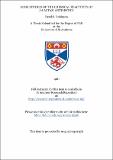Some studies of the chemical reactivity of β-lactam antibiotics
Abstract
Rate coefficients for the inactivation of several penicillin in acids and alkalis at 30°C have been determined by means of ultraviolet spectroscopy. The case of benzylpenicillin, though well investigated in the past, has been studied again and, in the light of new experiments, a scheme detailing the proportions of the various degradation products has been proposed. A number of substituted phenylpenicillins have been synthesised, and their reactions with acid have been investigated. Product analysis was carried out by means of TLG and NMR studies, the degradation products (penicilloic, penilloic, penillic and penicillenic acids) having been previously prepared and characterised. From the manner in which the phenyl substituent on the penicillin affects the rate coefficient, it is deduced that the mechanism of inactivation by acids involves a rate-determining intramolecular attack by the side-chain carbonyl group on the protonated β-lactam function. An intermediate oxazolone-thiazolidine structure is formed, which then reacts further by three different pathways. The proportions of the products obtained from the phenylpenicillins are different from those obtained from benazylpenicillin, principally because the phenylpenicillenic acids are easier to form and are less reactive towards acid than is benzylpenicillenic acid. The imidazole-catalysed isomerisation of benzylpenicillin into penicillenic acid has been studied. This reaction was investigated using a number of substituted imidazoles and, from the rate equations which were obtained, a unified reaction mechanism has been proposed. This involves a rate-determining proton-transfer to an intermediate penicilloylimidazole complex, which is followed by fast ring opening and expulsion of imidazole. Some studies on the novel mono-cyclic β-lactam antibiotic nocardicin A have been carried out; its reaction in dilute and moderately-concentrated acid has been studied. It is proposed that the mechanism of hydrolysis involves a fast β-lactam cleavage followed by slower hydrolysis of the oxime function. Unlike most oximes, that of nocardicin A was found to hydrolyse faster as the acidity was increased. It is suggested that this unusual behaviour arises from the proximity of an amide group to the oxime. Similar behaviour has been observed for benzoyl formamide oxime.
Type
Thesis, PhD Doctor of Philosophy
Collections
Items in the St Andrews Research Repository are protected by copyright, with all rights reserved, unless otherwise indicated.

